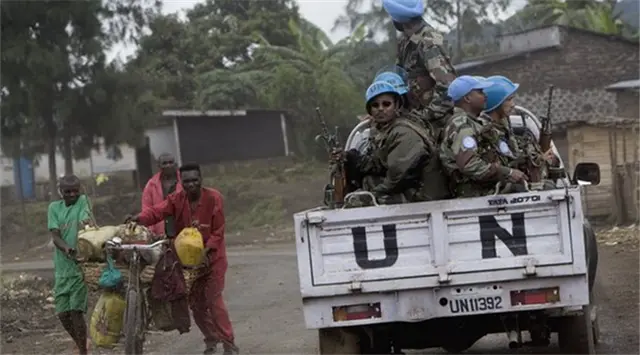Top UN peacekeepers, admittedly ashamed of reports of troops involved in sexual exploitation and abuse cases, said on Thursday the world organization is committed to eradicating the "scourge which actually dishonors" the work and sacrifices of peacekeepers.
UN Undersecretary-General for Peacekeeping Operations Herve Ladsous and Undersecretary-General for Field Support Atul Khare also said all stakeholders in peacekeeping missions have responsibilities in fighting SEA.
They made the remarks when meeting with reporters at UN Headquarters in New York to mark International Day of UN Peacekeepers, which falls on May 29.
"There are days when I feel ashamed to call my self a peacekeeper because this is not the job of peacekeepers," said Khare, a former peacekeeper. "I will never accept and I cannot accept if a protector is turning into a predator."
"I do believe that the morale to some extent is affected, but I think it is affected in the right attitude of peacekeepers," he said. "We are all committed to getting the bad sheep out of our midst."
"We are all committed to taking action against the scourge which actually dishonors the sacrifices of 129 peacekeepers (killed) last year," Khare said, adding it also dishonors all 175, 000 peacekeepers -- including those in African Union missions -- and their work "under extremely difficult circumstances."
For his part, Ladsous said, "Yes, there cannot be anything but shame but at the same time it is of course more than ever a necessity to do everything to prevent, to eradicate, to sanction."
The UN peacekeeping chief also said SEA by peacekeepers was not a responsibility of just the UN Secretariat, but there was a responsibility for member states of the organization who provide peacekeeping troops, "who did not give all the tools that we need to do it. It is shared responsibility, has to be a shared response. "
Among the tools sought, courts martial held in countries where SEA case allegations are presented, rather than repatriating of the accused. Frequently, it is not known if alleged perpetrators are ever brought to account.
Khare said several "mechanisms" have been deployed to fight SEA, including a public relations program borrowed from anti-terrorism campaigns.
"Phone numbers, contact points are available," he said. "But we realized that sometime people have difficulty in contacting these teams and that is why we have reinstituted what I call community-based mechanisms which include, depending on the country, religious organizations, voluntary organizations or simply the village head-man or the authorities of that group or region or towns."
"We have started a policy in which we say, 'If you see something say something,'" Khare said. "Everybody has a responsibility to inform us and this applies to people working under us. So we are promoting every avenue possible to get to these complaints."
He said success of the outreach program was responsible in part for the recent spike in reported SEA cases.
"Part of the increase in numbers which we are seeing now is not because the cases are happening now," Khare said. "The cases have happened way back in 2014 or 2015 but we are hearing about them now because we are going very much more proactive to get to the cases."
He explained, "we do get a spike as we improve the reporting mechanisms."
Thirty-nine of the 44 allegations involve uniformed personnel in the UN peacekeepers in the Central African Republic and other countries, such as Haiti, South Sudan and Cote d'Viore, UN spokesman Stephane Dujarric told reporters last week.
In early March, UN Secretary-General Ban Ki-moon said in his report that 69 allegations of sexual exploitation and abuse were reported in 10 UN peacekeeping missions in 2015 and called for on- site court-martials of alleged perpetrators and DNA testing to identify them.
The report, for the first time, provided the names of all countries whose troops are allegedly involved. The allegations will be posted online and updated with the progress and outcome of investigations.
The 69 allegations reported last year were a marked increase from the 52 in 2014, and higher than the 66 in 2013, the report said.
Nearly one-third of the 2015 allegations, or 22, are from the UN peacekeeping mission in the Central African Republic, which has made headlines over reports of some peacekeepers sent to protect civilians instead traded sex for money and sexually abused minors.
(APD)
 简体中文
简体中文

